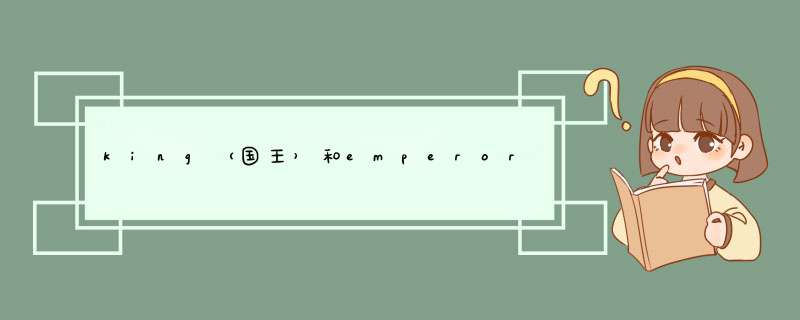
Emperor
读音:英[ˈempərə(r)] 美[ˈɛmpəɚ]
释义:皇帝。
King
读音:英[kɪŋ] 美[kɪŋ]
释义:
1、(常大写)王,国王,君主
2、(某范围内)最有势力者、大王
国王和皇帝都是君主国的国家元首,但国王和皇帝有区别的:
emperor早期是特指罗马帝国的皇帝,而King则泛指国王。
1、比如,法兰克王国的国王能称为KING,但他却不一定是emperor,只有在教皇正式加冕成为神圣罗马帝国皇帝后,才是emperor。
而在高卢和日尔曼地区外,emperor有时也指统治多个地区的国王,到后来,emperor这个词应该是指empire的统治者,像拿破仑和拿破仑三世都是法兰西帝国的emperor。
2、以古代中国做类比,皇帝是大一统中国的第一号人物,分封到各地的皇亲国戚和功臣才称国王。也就是说,国王是皇帝诰封的。
简单的来说,皇帝,是由教皇加冕,获得教皇承认的,国王,相当于中国的诸侯。相对来说,King似乎要比emperor低一级。
拿破仑建立法兰西第一帝国,自称皇帝(Empire)。
扩展资料:
例句
1、Emperor
The First Emperor of Qin unified China in 221 BC
秦始皇于公元前221年统一中国。
The emperor promoted the general and lavished him with gifts
皇帝擢升了将军并赏给他丰厚的礼物。
He had implicit faith in the noble intentions of the Emperor
他对皇帝的高尚意图深信不疑。
2、King
King Arthur hid his treasures here and Merlin enchanted the cave so that nobody should ever find them
亚瑟王将他的财宝藏在这里,墨林对洞穴施了魔法,这样永远不会有人找到那些财宝。
They asked my father to intercede with the king on their behalf
他们请我父亲为他们向国王求情。
The King took a fancy to ordering disguises and masks
国王迷上了订购化装用品和面具。
king
n
国王, 君主, (部落的)首领, 纸牌中的K
vt
立为王
vi
做国王, 统治
Abbr k, KA male sovereign
缩写 k, K国王:男性统治者
One that is supreme or preeminent in a particular group, category, or sphere
王:在某一特定集团、部门或领域中最高或最突出者
King
King
The perfect, omniscient, omnipotent being; God
上帝:完美的,无所不知的,万能的存在;上帝
Jesus
耶稣
Games
游戏
A playing card bearing the figure of a king, ranking above a queen
老K:画有国王的像的纸牌,级别比王后高
Abbr K, kThe principal chess piece, which can move one square in any direction and must be protected against checkmate
缩写 K, k王:象棋中主要的棋子,可以向任何方向移动一个方格,但必须保护它不被将死
A piece in checkers that has been moved to the last row on the opponent's side of the board and been crowned, thus becoming free to move both forward and backward
王:在移到对方的边界这一排后,成为王,因而开始自由的向前或向后移的棋子
Kings (used with a sing verb)Abbr KBible See table at Bible
Kings (与单数动词连用)缩写 K圣经 参见 Bible
adj(形容词)
Principal or chief, as in size or importance
王的:在规模或重要性上是基本的或主要的
vtr(及物动词)
kinged, kinging, kings游戏
To make (a piece in checkers) into a king; crown
成为国王:把(一只棋子)变成国王;成为国王Abbr k, KA male sovereign
缩写 k, K国王:男性统治者
One that is supreme or preeminent in a particular group, category, or sphere
王:在某一特定集团、部门或领域中最高或最突出者
King
King
The perfect, omniscient, omnipotent being; God
上帝:完美的,无所不知的,万能的存在;上帝
Jesus
耶稣
Games
游戏
A playing card bearing the figure of a king, ranking above a queen
老K:画有国王的像的纸牌,级别比王后高
Abbr K, kThe principal chess piece, which can move one square in any direction and must be protected against checkmate
缩写 K, k王:象棋中主要的棋子,可以向任何方向移动一个方格,但必须保护它不被将死
A piece in checkers that has been moved to the last row on the opponent's side of the board and been crowned, thus becoming free to move both forward and backward
王:在移到对方的边界这一排后,成为王,因而开始自由的向前或向后移的棋子
Kings (used with a sing verb)Abbr KBible See table at Bible
Kings (与单数动词连用)缩写 K圣经 参见 Bible
adj(形容词)
Principal or chief, as in size or importance
王的:在规模或重要性上是基本的或主要的
vtr(及物动词)
kinged, kinging, kings游戏
To make (a piece in checkers) into a king; crown
成为国王:把(一只棋子)变成国王;成为国王
不知道对不对:
emperor早期是特指罗马帝国的皇帝,而King则泛指国王比如,法兰克王国的国王能称为KING,但他却不一定是emperor,只有在教皇正式加冕成为神圣罗马帝国皇帝后,才是emperor
而在高卢和日尔曼地区外,emperor有时也指统治多个地区的国王,比如Alfonso VII就曾经称自己是“emperor of all Spain”(1135)
到后来,emperor这个词应该是指empire的统治者,像拿破仑和拿破仑三世都是法兰西帝国的emperor
相对来说,KING似乎要比emperor低一级,大不列颠百科全书里对KING是这么解释的:"a supreme ruler, sovereign over a nation or a territory, of higher rank than any other secular ruler except an emperor, to whom a king may be subject"
国王king,读音:英[kɪŋ],美[kɪŋ]。
释义:
n 国王;最有势力者;王棋。
vi 统治;做国王。
vt 立…为王。
adj 主要的,最重要的,最大的。
变形:复数kings。
例句:The king has passed away
国王已经去世了。
短语:
King Kong金刚
The Lion King狮子王
Burger King汉堡王
KING ARTHUR亚瑟王
king的用法
king的基本意思是“君主,国王”,指一个君主制国家中处于至高无上地位的男人,与其相对应的阴性名词是queen。king用于比喻还可表示“巨头,大王”或某一行业中的“杰出人物”。
表示封、立、宣布或选举某人为国王时,其前一般不用冠词,其余情况下常加定冠词the。
king后常接介词of,表示“…的国王,…中之王”。
king与表示人名的专有名词连用时可专有化,首字母须大写。
欢迎分享,转载请注明来源:浪漫分享网

 微信扫一扫
微信扫一扫
 支付宝扫一扫
支付宝扫一扫
评论列表(0条)